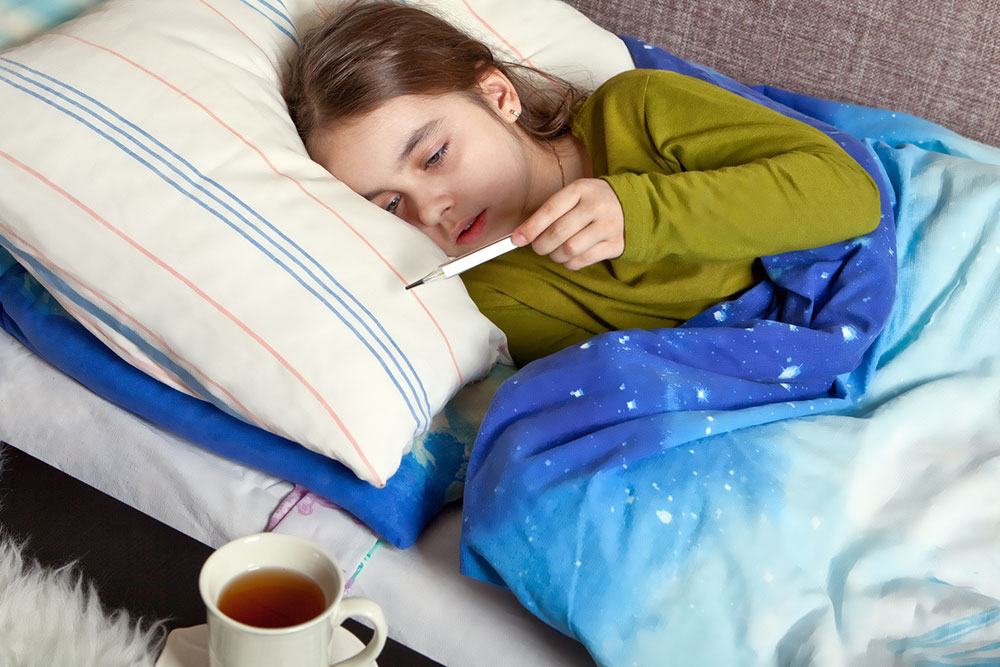Methods to Use a Thermometer and a Fever Temperature Chart with Children
The fever temperature chart indicates the range of normal temperature measured in different ways for different age groups of children. When the temperature exceeds the upper limit, it is an indication of fever.
Measuring fever in a child
The mode of measurement depends on the extent of discomfort the child is facing as well as the target temperature indicated by the fever temperature chart. The fever temperature chart varies according to the age group of the child. For children between 0 and 3 months, normal temperature is between 97℉ or 36℃ to 100.4℉ or 38℃ or and temperatures above 100.4℉ or 38℃ indicate fever.

Situations when medical consultation is required
Medical consultation is necessary when the temperature as per the fever temperature chart indicates fever and if there are certain accompanying symptoms.
Babies below 3 months with fever require immediate medical attention.
Children : When the child is fussy or not behaving in a normal way even after medications to reduce fever have been administered, or if he/she is refusing fluids and is dehydrated with dryness of the mouth, stiffness of the neck or a headache, pain in the abdomen, difficulty breathing, rashes or pain in the joints, fever persisting continuously for 5 days—these are the signs that a doctor needs to be consulted.
Different ways to measure temperature and corresponding fever temperature chart ranges
It is advisable to use a digital thermometer to measure someone’s temperature for recording and determining the fever levels. The different thermometers that are available include—rectal thermometers, oral thermometers, thermometers for measuring temperature through the temporal artery, and thermometers to measure the temperature through the armpit or the ear.
The rectal temperature in case of infants:
For rectal measurement, the normal range is from 97.9 ℉ to 100.4 ℉ or 36.6 ℃ to 38 degrees Celsius. Temperature over 100.4 ℉ or 38 ℃ indicates fever.
In case of measuring rectal temperature, lubricate the tip of the digital thermometer with petroleum jelly. With knees in a flexed position, the child should be laid on the stomach or on the side. The tip should be inserted up to 1 inch with extreme care into the rectum.
You need to ensure the child does not move until the beep from the thermometer indicates that it’s over.
Oral temperature :
For oral measurements, the normal range is between 95.5 ℉ and 99.5 ℉ or 35.3 ℃ to 37.5 ℃. When the temperature is greater than 99.5 ℉ or 37.5 ℃, that is an indication of fever.
After the digital thermometer is switched on, the tip should be placed below the tongue. Ensure that the mouth is closed until the beep is heard. One can then check the temperature.
Temperature from the temporal artery :
The fever temperature chart in case of temporal measurement states that temperature is normal when it ranges from 97.9 ℉ to 100.1 ℉ or 36.6 ℃ to 37.8 ℃. When the temperature is greater than 100.1 ℉ or 37.8 degrees Celsius, that is an indication of fever.
The temperature is measured by sweeping the thermometer through the forehead.
Armpit temperature :
The fever temperature chart in case of axillary measurement states that temperature is normal when it ranges from 94.5 ℉ to 99.3 ℉ or 34.7 ℃ to 37.4 ℃. When the temperature is greater than 99.3 ℉ or 37.4 ℃, it is an indication of fever.
The digital thermometer is switched on and placed under the arm and one has to ensure it is in contact with the skin. The thermometer should be held tightly and taken out after the beep is heard after which the temperature can be checked.
Ear temperature :
The fever temperature chart in case of tympanic measurement states that temperature is normal when it ranges from 96.3 ℉ to 100 ℉ or 35.7 ℃ to 37.8 ℃. When the temperature is greater than 100 ℉ or 37.8 ℃, that is an indication for fever.
Read the instructions given along with your thermometer carefully, and put the thermometer in the ear canal up to the indicated distance. The thermometer should be tightly held and it has to be taken out only after the beep is heard. The temperature can then be checked.
Precautions to be followed when using the thermometers:
While using thermometers, the instructions that are provided with the thermometer should be read carefully. Make sure you use lukewarm water along with soap or rubbing alcohol to thoroughly clean the thermometer before using it. Ensure that separate thermometers are used for measuring temperatures orally and through the rectum. Use separate labels for safety purposes.

